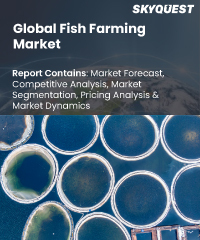
Report ID: SQMIG30I2340

Report ID:
SQMIG30I2340 |
Region:
Global |
Published Date: March, 2024
Pages:
198
|
Tables:
66 |
Figures:
80
Fish Farming Market size was valued at USD 285.04 Billion in 2023 and is poised to grow from USD 299.86 Billion in 2024 to USD 449.82 Billion by 2032, growing at a CAGR of 5.2% during the forecast period (2025-2032).
The Global Fish Farming Market, also known as aquaculture, has experienced remarkable growth due to increasing demand for seafood, declining wild fish stocks, and the need to meet global protein requirements. Fish farming involves the controlled cultivation of aquatic organisms, including fish, crustaceans, and mollusks, in freshwater, brackish water, or marine environments. The market's growth is driven by several factors. Firstly, the rising global population has led to higher demand for seafood as a protein source, prompting the aquaculture industry to expand and bridge the gap between supply and demand. Additionally, environmental concerns over overfishing and its impact on marine ecosystems have shifted focus towards sustainable aquaculture practices. Technological advancements in aquaculture systems, improved feed formulations, and disease management techniques have enhanced production efficiency and reduced environmental impact. This has attracted investments and innovation in the sector. Fish farming contributes to rural employment, economic growth, and food security in many regions, particularly in developing economies. Salmon, tilapia, carp, and shrimp are among the most cultivated species in fish farming. The market has also seen the integration of aquaculture into land-based systems and the development of recirculating aquaculture systems (RAS) to optimize water usage and minimize waste.
US Fish Farming Market is poised to grow at a sustainable CAGR for the next forecast year.
Our industry expert will work with you to provide you with customized data in a short amount of time.
REQUEST FREE CUSTOMIZATIONWant to customize this report? This report can be personalized according to your needs. Our analysts and industry experts will work directly with you to understand your requirements and provide you with customized data in a short amount of time. We offer $1000 worth of FREE customization at the time of purchase.

Report ID: SQMIG30I2340